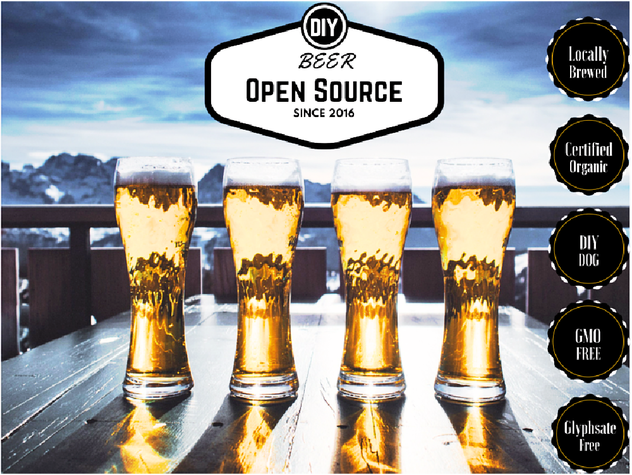For those seeing the word ‘open source’ for the first time, the depth and dimensionality of it can sometimes be missed. Originally, open source was associated with computer programming in which the source code is available to the general public for use or modification from its original design free of charge. However, the cross-pollination of the open source concept is slowing bleeding into every area of daily human affairs. The advantages of an open source paradigm are endless while many of the disadvantages rest solely on those individuals, corporations and sectors based on secrecy and control. In fact, an open source ideology is the very antithesis of unfair advantage and monopolistic dealings.
So what about the beer? Control, moneyed interests and dangerous monopolies constitute various modern corporate dealings and political policies/actions. Such matters are usually to the detriment of the many and the benefit of the few. So within the community of beer drinkers and brewers comes a glimpse into the simple framework of open sourcing that can be applied anywhere, to any business, sector or individual patentable creation.
Brew Punks Raise the Bar
Enter Brewdog beer who, according to its website states:
“Martin and I (James) were bored of the industrial brewed lagers and stuffy ales that dominated the UK beer market.We decided the best way to fix this undesirable predicament was to brew our own. Consequently in April 2007 BrewDog was born.”
2015 was the company’s biggest year growing sales by 130 percent while at the same time employing 540 people and having 32,000 crowdfunded shareholders. BrewDog has become a serious grassroots contender having established itself not only throughout the UK, but also in Singapore, Thailand, USA, Netherlands, Australia, Russia, Ireland, Czech Republic, France, New Zealand, Canada, China, Switzerland, Austria, Greece, South Korea and Denmark. The company has also released a 21st century business manifesto book titled Business for Punks in which it suggests:
“To succeed – ignore everything else and start a revolution. The only way to stand a chance is not to plan the bottom line, it is to put everything on the line.”
In a sector whose cornerstone has been built upon secret recipes and hidden ingredients, Brewdog did the unspeakable — the company open sourced all their recipes online. Operated from a passion for great craft beer, founders Martin and James made the decision to not only sell their product, but give the ability to any brewer big or small throughout the world to make it themselves. By open sourcing the recipes for their company’s entire back catalog of 215 beers, the secret is out, the sector is in a tizzy and the world is witnessing another example of the instant disruption the open source paradigm can have.
Large, industrial corporate beer manufacturers are hoping the news BrewDogs DIY DOG downloadable brewing catalog passes through the public consciousness without much fanfare. Beer changed the course of history for our ancestors, and it appears it may be responsible for another quantum leap in our modern times.
So what about the beer? Control, moneyed interests and dangerous monopolies constitute various modern corporate dealings and political policies/actions. Such matters are usually to the detriment of the many and the benefit of the few. So within the community of beer drinkers and brewers comes a glimpse into the simple framework of open sourcing that can be applied anywhere, to any business, sector or individual patentable creation.
Brew Punks Raise the Bar
Enter Brewdog beer who, according to its website states:
“Martin and I (James) were bored of the industrial brewed lagers and stuffy ales that dominated the UK beer market.We decided the best way to fix this undesirable predicament was to brew our own. Consequently in April 2007 BrewDog was born.”
2015 was the company’s biggest year growing sales by 130 percent while at the same time employing 540 people and having 32,000 crowdfunded shareholders. BrewDog has become a serious grassroots contender having established itself not only throughout the UK, but also in Singapore, Thailand, USA, Netherlands, Australia, Russia, Ireland, Czech Republic, France, New Zealand, Canada, China, Switzerland, Austria, Greece, South Korea and Denmark. The company has also released a 21st century business manifesto book titled Business for Punks in which it suggests:
“To succeed – ignore everything else and start a revolution. The only way to stand a chance is not to plan the bottom line, it is to put everything on the line.”
In a sector whose cornerstone has been built upon secret recipes and hidden ingredients, Brewdog did the unspeakable — the company open sourced all their recipes online. Operated from a passion for great craft beer, founders Martin and James made the decision to not only sell their product, but give the ability to any brewer big or small throughout the world to make it themselves. By open sourcing the recipes for their company’s entire back catalog of 215 beers, the secret is out, the sector is in a tizzy and the world is witnessing another example of the instant disruption the open source paradigm can have.
Large, industrial corporate beer manufacturers are hoping the news BrewDogs DIY DOG downloadable brewing catalog passes through the public consciousness without much fanfare. Beer changed the course of history for our ancestors, and it appears it may be responsible for another quantum leap in our modern times.
Weedkiller Found in the Competition
Why not keep buying industrial brewed lagers and stuffy ales? This is the question that represents the entire open source concept being applied to the current beer example. Germany, renowned for its world-leading beer brewing and longtime reputation of purity has reported finding weedkiller in 14 of is most popular beers. A report released by The Munich Environmental Institute cited “alarming” levels of the herbicide glyphosate, a 2A carcinogen, found in German beers. Interestingly, 2016 marks half a millennium since the Purity Law for beer was first written down. In 1516 Bavaria — then an independent duchy — defined beer as only containing hops, malt, yeast, and water. The stipulation was later adopted in other parts of the states that would later become Germany. Here we see an early similarity of today’s open source idea as the Bavarian people openly documented the beer recipe into their immutable public ledger of the time.
The world is seeing the open source theme move in and shake up banking, finance, investing, farming and countless other sectors and businesses. The conversation is only just beginning regarding the benefits and advantages open sourcing can accomplish.
Why not keep buying industrial brewed lagers and stuffy ales? This is the question that represents the entire open source concept being applied to the current beer example. Germany, renowned for its world-leading beer brewing and longtime reputation of purity has reported finding weedkiller in 14 of is most popular beers. A report released by The Munich Environmental Institute cited “alarming” levels of the herbicide glyphosate, a 2A carcinogen, found in German beers. Interestingly, 2016 marks half a millennium since the Purity Law for beer was first written down. In 1516 Bavaria — then an independent duchy — defined beer as only containing hops, malt, yeast, and water. The stipulation was later adopted in other parts of the states that would later become Germany. Here we see an early similarity of today’s open source idea as the Bavarian people openly documented the beer recipe into their immutable public ledger of the time.
The world is seeing the open source theme move in and shake up banking, finance, investing, farming and countless other sectors and businesses. The conversation is only just beginning regarding the benefits and advantages open sourcing can accomplish.







 RSS Feed
RSS Feed